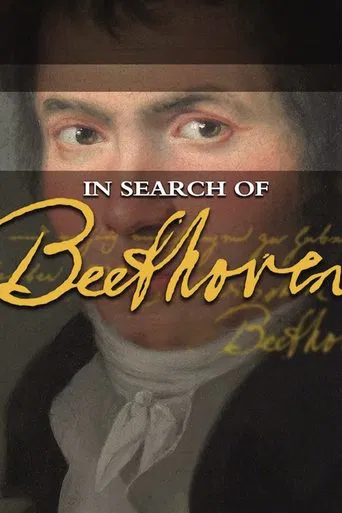

In Search of Beethoven is essentially a biography. Through studies of his music and fragments of letters written by Beethoven, the film traces the chapters of his life and his growing musical prowess.In the beginning of the film, there is an assertion that Beethoven might be the greatest composer of all time. The film sets about making its case and--no surprise--it is fairly successful. No one seriously doubts the prodigious talents of Ludwig van. Nevertheless, the film places his musical development within the historical happenings of Europe, helping the viewer to better understand the forces that were at play in his life. His life touched the lives of other great composers, Napoleon, and Goethe, for example. And these contacts helped shape his musical career.As someone who was fairly knowledgeable about Beethoven's circumstances, I still found the film entertaining. The timeline of his life helped to clarify. And the numerous performances of Beethoven's music illustrated his genius and his extraordinary creativity.The film makes the case that though Beethoven's life was tragic with regard to his health and his romantic choices, he was ever the optimist--a well-supported position that I consider a pleasing discovery.However, am I the only viewer who thought that the Ninth Symphony was represented by a somewhat weak performance (maybe because that orchestra was dedicated to performing in the style of the piece's time, without anachronisms)?Those who enjoy classical music or Beethoven's works should appreciate this film. Anyone who wants to learn about western classical music should find the film informative.
... View MoreIn Search of Beethoven was metaphorically a personal search for the substance of a musical genius for which I knew only superficial facts. Diane and I both thought the film was superb in allowing the viewer into this man's life and did this search primarily through his music. When the credits rolled at the end it was possible to fleetingly see all the musicians involved in demonstrating the various musical pieces that provided the bulk of this remarkable film and there were many. There were many artists and many pieces of his musical opus and from this analysis even someone untrained in music, such as me, had demonstrated for them the complexity, playfulness and virtuosity that composed this man's decades of work. Although the film was essentially musically based, my eye was drawn to another film making element that was not auditory and that was the cinematography. I am sure that I am demonstrating my own lack of knowledge about how music playing is filmed but I was continually impressed with the Big Close Ups used throughout the film. For instance, if the particular piece being played used a violin then the camera would move in and focus on only the hand or if it were a piano piece then the camera would focus only on the hand at the keyboard. I found these big close ups very gripping in their intensity and illustrative of the composition being discussed. Any person with or without knowledge of music could hugely profit from two hours spent with this musical genius.
... View MoreA fascinating story, very well structured and put together in a narrative sense, but very lacking cinematically. I imagine it would work well as a two-parter for TV, but in the cinema, after two hours, I was longing for some relief from the (almost all) poorly composed close-ups of the (very interesting) interviewees, from the constant shots of twigs and of wintry rural miscellany, and from the unimaginative coverage of musical performances. There are far too many close-ups of instruments being played, without a wider perspective, or a contextual association.. geography. And why were almost all the talking-head shots framed to exclude people's hair, yet include much of their shirts? Was it because the director hadn't thought of subtitles and had to reconfigure the compositions in post-production? The most extreme close-up was of a man with unfortunately large ears. There are more flattering ways to photograph such people; and the audience is more likely to pay attention to what he is saying, and not stare at his ears. For Mr Grabsky's next film, may I suggest - if he can afford it - hire a full-time cameraman, someone who sees stories visually. This is a great story, but not a very good-looking one.
... View MoreIt must be an exceptionally rare person, who is not moved by Beethoven's music. Thus, a film, like this, that includes lots of his music, in some very good performances, is bound to please many. However, it did not live up to the advertisement, which drew me to the Siskel Film Center to see Grabsky's opus, and which promised new insights into the life of this musical god. I think that the film tries to cover too much, and ends up being fragmentary and rehashing old ground. Even a film that is 139 minutes long, cannot adequately encompass most of Beethoven's life and music, as this documentary attempts to do. There are a few revealing insights, like the story of the young Beethoven's attempt to con his teacher, Haydn, into interceding with the Elector of Bonn to increase Beethoven's stipend, when he was studying in Vienna. But even this (new to me) story is not used to try to explain more about Beethoven. For the most part, this is a static film, that relies on talking heads and interminable footage of Beethoven's familiar portraits. One of the few talking heads, who actually has interesting things to say about Beethoven's music, and who also reveals himself as a very human, self-deprecating artist, is Emanual Ax. Too many others offer no special insights, and only mouth the same tired platitudes. In summary, this film is enjoyable for the music, but don't expect to learn many new insights about this great composer.
... View More